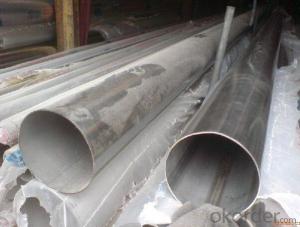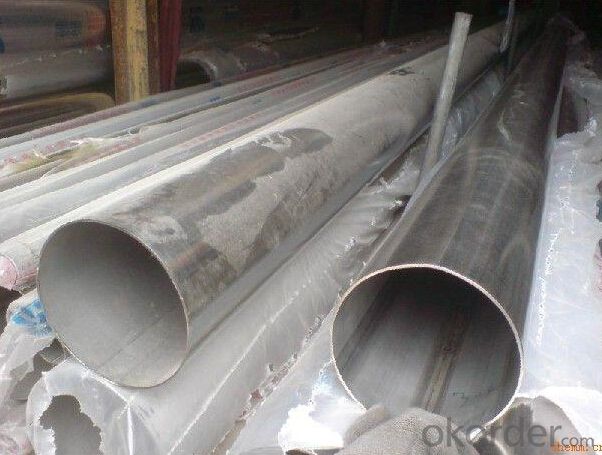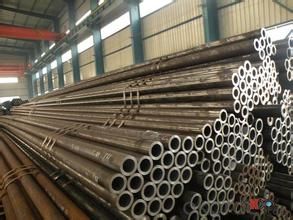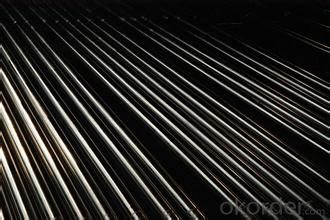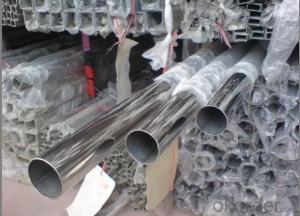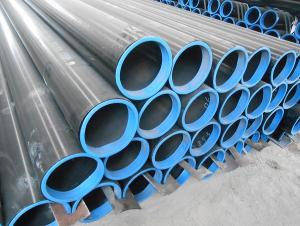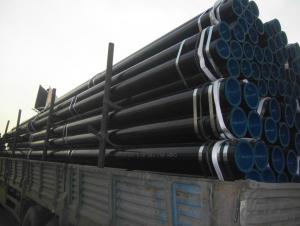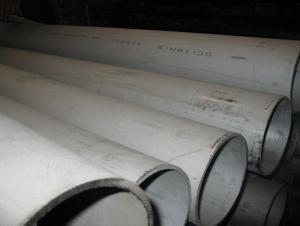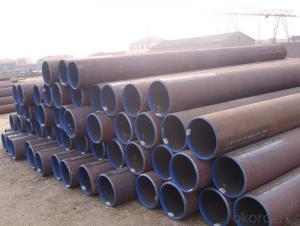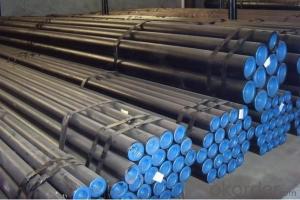Welded Stainless Seamless Hot Rolled Steel Pipe
- Loading Port:
- China main port
- Payment Terms:
- TT or LC
- Min Order Qty:
- 100 kg
- Supply Capability:
- 10000 kg/month
OKorder Service Pledge
OKorder Financial Service
You Might Also Like
1、Structure of Seamless Pipe :
Seamless pipe is formed by drawing a solid billet over a piercing rod to create the hollow shell. Since the manufacturing process doesn't include welding, seamless pipes are stronger and more reliable. Historically seamless pipe was regarded as withstanding pressure better than other types, and was often more easily available than welded pipe.
2、Main Features of the Seamless Pipe :
• High manufacturing accuracy
• High strength
• Small inertia resistance
• Strong heat dissipation ability
• Good visual effect
• Reasonable price
3、Seamless Pipe Specification:
1) Material:20#(ASTM A 106/A53 GRB.API5LGRB,GB),45#,16Mn,10#.
2) Specification range:OD:21.3-610mm,WT:6-70mm,length:6-12m or according to the requirement of clients.
3) Excutive standards:GB,ASME API5L.ASTM A 106/A53,Despite of the above standards,we can also supply seamless steel pipe with standard of DIN,JIS,and so on,and also develop new products according to the requirements of our clients!
4) Surface:black lacquered,varnish coating or galvanized.
5) Ends:Beveled or square cut,plastic capped,painted.
6) Packing:bundles wrapped with strong steel strip,seaworthy packing.
4、Packaging & Delivery
Packaging Details: | seaworthy package,bundles wrapped with strong steel strip |
Delivery Detail: | 15-30days after received 30%TT |
5、FAQ of Seamless Pipe :
①How is the quality of your products?
Our products are manufactured strictly according to national and internaional standard, and we take a test on every pipe before delivered out. If you want see our quality certifications and all kinds of testing report, please just ask us for it.
Guaranteed: If products’ quality don’t accord to discription as we give or the promise before you place order, we promise 100% refund.
②How about price?
Yes, we are factory and be able to give you lowest price below market one, and we have a policy that “ for saving time and absolutely honest business attitude, we quote as lowest as possible for any customer, and discount can be given according to quantity”,if you like bargain and factory price is not low enough as you think, just don’t waste your time.Please trust the quotation we would give you, it is professional one.
③Why should you chose us?
Chose happens because of quality, then price, We can give you both.Additionally, we can also offer professional products inquiry, products knowledge train(for agents), smooth goods delivery, exellent customer solution proposals.Our service formula: good quality+good price+good service=customer’s trust
SGS test is available, customer inspection before shipping is welcome, third party inspection is no problem.
Any question, pls feel free to contact us !
6、Seamless Pipe Images:
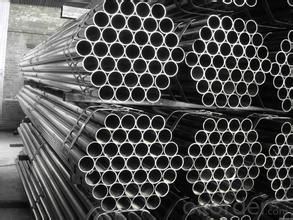
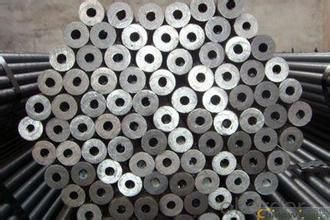
- Q: What is the difference between steel pipes and PVC pipes?
- Steel pipes are made from steel, which is a strong and durable material that can withstand high pressure and extreme temperatures. They are commonly used for transporting fluids and gases in industries such as oil and gas, construction, and plumbing. On the other hand, PVC pipes are made from polyvinyl chloride, a lightweight and corrosion-resistant plastic material. PVC pipes are more cost-effective, easier to install, and resistant to chemicals and corrosion. They are commonly used for drainage, irrigation, and plumbing in residential and commercial applications.
- Q: Can steel pipes be used for conveying abrasive materials?
- Yes, steel pipes can be used for conveying abrasive materials. Steel pipes are known for their durability and resistance to wear, making them suitable for handling abrasive materials. Additionally, steel pipes can be lined with various protective coatings or linings to further enhance their resistance to abrasion and extend their lifespan.
- Q: How are steel pipes used in the manufacturing of railways?
- The manufacturing of railways involves the versatile use of steel pipes. In the context of railway construction, steel pipes serve as a fundamental component for the creation of rail tracks. These pipes are joined together through welding to form robust and lengthy tracks capable of withstanding the weight and pressure exerted by passing trains. Moreover, steel pipes find application in the manufacturing of railway bridges and tunnels. These structures necessitate the utilization of strong and resilient materials in order to guarantee the safety and stability of the railway system. Steel pipes are frequently employed in the construction of supporting structures and piers that uphold the bridges. Additionally, they provide structural support and stability for tunnels. Furthermore, steel pipes contribute to the production of various railway components and equipment. For instance, they are used in the fabrication of railway signaling systems responsible for managing train movement and ensuring safety. These pipes are commonly utilized to encase and safeguard the electrical wiring and other components of the signaling systems. In addition, steel pipes play a significant role in the manufacturing of railway carriages and locomotives. They serve as the framework and structure of the train, imparting strength and stability. Furthermore, steel pipes are utilized for diverse purposes such as creating air conditioning systems, brake systems, and fuel delivery systems within the train. Overall, steel pipes occupy a pivotal position in the manufacturing of railways. They are indispensable for the construction of rail tracks, bridges, tunnels, and a variety of railway components and equipment. The strength and durability of steel make it an ideal material for ensuring the safety and efficiency of railway systems.
- Q: What are the different joining methods for steel pipes?
- There are several joining methods for steel pipes, including welding, threaded connections, flanged connections, and mechanical couplings. Welding involves melting the ends of the pipes and fusing them together using heat. Threaded connections involve screwing the pipes together using threaded ends. Flanged connections use flanges that are bolted together to connect the pipes. Mechanical couplings use a variety of methods such as compression fittings or grooved couplings to connect the pipes without welding or threading.
- Q: What's the difference between steel pipe and pipe fittings?
- Pipe classification: steel pipe seamless steel pipe and welded steel pipe (tube) two categories. It can be divided into round tube and special-shaped tube according to the sectional shape. The round steel tube is widely used, but there are some special-shaped steel tubes such as square, rectangle, semicircle, hexagon, equilateral triangle and octagon.
- Q: What is the difference between API 5L and ASTM A106 steel pipes?
- API 5L and ASTM A106 steel pipes are both widely used in the oil and gas industry, but they have some key differences. API 5L is a specification for seamless and welded steel pipes used for pipeline transportation systems in the petroleum and natural gas industries. It covers various grades of carbon and alloy steel pipes, with different strength levels and impact requirements. API 5L pipes are designed for conveying fluids, such as oil, gas, and water, over long distances. On the other hand, ASTM A106 is a specification for seamless carbon steel pipes used for high-temperature service. It covers seamless pipes for pressure and mechanical applications, including transportation of fluids and gases in industries like refineries, power plants, and boilers. While both API 5L and ASTM A106 pipes are used in similar applications, the main difference lies in their intended use and the specific requirements they must meet. API 5L pipes are primarily used for pipeline transportation systems, whereas ASTM A106 pipes are more focused on high-temperature service applications. Additionally, the manufacturing processes and testing requirements for both specifications may vary.
- Q: How are steel pipes protected against fire?
- Steel pipes are protected against fire through various methods such as applying intumescent coatings, using fire-resistant insulation, or encasing them in fire-rated enclosures. These measures help to delay the heat transfer and maintain the structural integrity of the pipes during a fire, allowing them to withstand high temperatures and prevent the spread of fire.
- Q: How are steel pipes made?
- Steel pipes are made through a process called pipe manufacturing, which involves several steps. First, raw materials such as iron ore, coal, and limestone are melted in a blast furnace to produce molten iron. The molten iron is then mixed with recycled steel and processed in a basic oxygen furnace or electric arc furnace to refine its composition and remove impurities. Once the desired steel grade is achieved, it is cast into billets, which are heated and pierced to form a hollow cylindrical shape. These pierced billets are then elongated and shaped into pipes through a process called hot rolling or cold drawing. Finally, the pipes undergo various finishing operations, such as straightening, cutting, and inspection, before being ready for use in various applications.
- Q: What is the difference between internal threading and external threading of steel pipes?
- The difference between internal threading and external threading of steel pipes lies in the location and method of threading. Internal threading refers to the process of creating threads on the inside surface of a steel pipe, allowing it to be connected to other components with external threads. On the other hand, external threading involves creating threads on the outside surface of a steel pipe, enabling it to be joined with components having internal threads. These two methods serve different purposes and are utilized depending on the specific requirements of the plumbing or assembly project.
- Q: What are the different pipe fittings used with steel pipes?
- Some common pipe fittings used with steel pipes include couplings, elbows, tees, unions, reducers, and caps.
Send your message to us
Welded Stainless Seamless Hot Rolled Steel Pipe
- Loading Port:
- China main port
- Payment Terms:
- TT or LC
- Min Order Qty:
- 100 kg
- Supply Capability:
- 10000 kg/month
OKorder Service Pledge
OKorder Financial Service
Similar products
Hot products
Hot Searches
Related keywords
